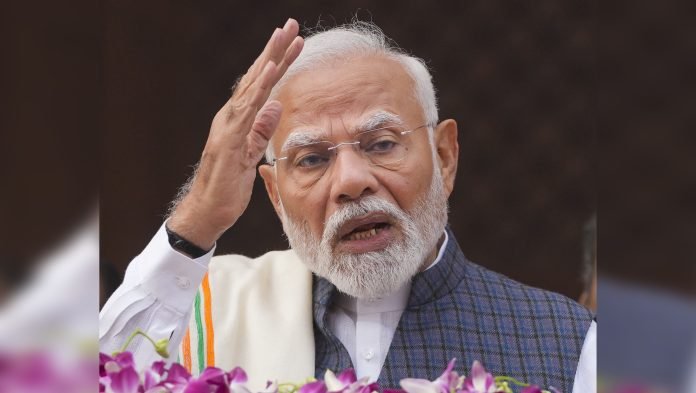NEW DELHI, Nov 26: In a significant move aimed at accelerating India’s development, Prime Minister Narendra Modi on Tuesday highlighted several major decisions taken by the Union Cabinet, which will have a profound impact on infrastructure, agriculture, and innovation. The approved projects are expected to benefit states like Maharashtra, Madhya Pradesh, and Uttar Pradesh, alongside national initiatives aimed at promoting sustainable farming practices and empowering India’s youth.
Rail Projects to Enhance Connectivity
The Union Cabinet, chaired by Prime Minister Modi, approved three major rail infrastructure projects worth Rs 7,927 crore. These projects will strengthen the railway network, improve connectivity, and promote economic growth along key routes between Mumbai and Prayagraj.
The approved projects include:
- Jalgaon-Manmad Fourth Line (160 km): This will ease congestion and improve the flow of goods and passengers between the two locations in Maharashtra.
- Bhusawal-Khandwa Third and Fourth Lines (131 km): This project will boost connectivity between important industrial hubs in Madhya Pradesh.
- Prayagraj (Iradatganj)-Manikpur Third Line (84 km): This is part of the efforts to strengthen rail infrastructure in Uttar Pradesh and enhance connectivity to key cities.
The projects are expected to ease travel time, reduce freight costs, and contribute to the economic development of the regions, Prime Minister Modi said in a post on X (formerly Twitter). He described improved infrastructure as key to “connecting dreams and accelerating progress” for the nation.
National Mission on Natural Farming
Another transformative decision announced was the launch of the National Mission on Natural Farming, a pioneering initiative to promote sustainable agricultural practices. Under this mission, the government aims to reach one crore farmers and cover 7.5 lakh hectares of land over the next two years. The initiative has been allocated a budget of Rs 2,481 crore.
Prime Minister Modi emphasized that the mission would help nurture soil health, protect biodiversity, and secure the future of Indian agriculture. “Through this effort, we are nurturing soil health, protecting biodiversity, and securing our agricultural future. It reaffirms our commitment to sustainable farming and prosperity for farmers,” he said.
‘One Nation, One Subscription’ and Empowering Academia
The Cabinet also approved the ‘One Nation One Subscription’ initiative, which aims to strengthen India’s academic ecosystem by providing seamless access to research, learning, and knowledge across the country. The move is expected to encourage interdisciplinary studies, empower students and researchers, and make India a global hub for education and innovation.
“This is a game-changer for Indian academia and youth empowerment,” Prime Minister Modi said, stressing that the initiative would be pivotal for fostering a culture of learning and collaboration.
Atal Innovation Mission Extended
The government also announced the continuation of the Atal Innovation Mission (AIM), a flagship program aimed at fostering innovation in India. The initiative, which supports young entrepreneurs and startups, is designed to accelerate India’s growth in sectors such as science, technology, and industry.
“The Cabinet decision relating to the continuation of the Atal Innovation Mission reflects our government’s unwavering commitment to fostering innovation,” Modi stated. The mission continues to play a vital role in enhancing India’s global competitiveness and nurturing a vibrant ecosystem for innovation.
Conclusion
Prime Minister Modi’s remarks on the Cabinet’s decisions highlighted a clear vision of sustainable development, improved infrastructure, and a focus on innovation as essential pillars for India’s future. The approval of these initiatives marks a decisive step toward realizing India’s aspirations of becoming a global leader in research, innovation, and sustainable agricultural practices.
With these projects, the government aims not only to boost economic growth but also to create lasting impact in the lives of farmers, students, and innovators across the country.

